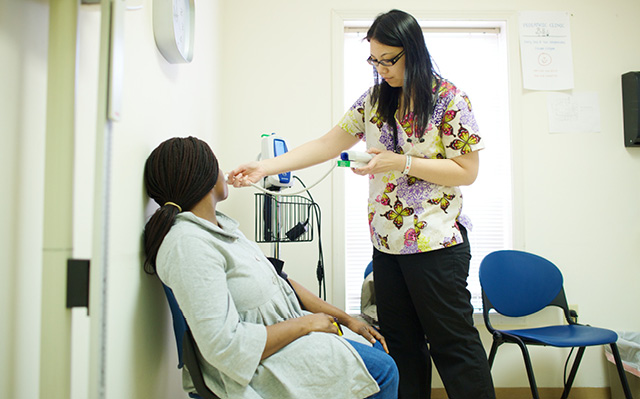Local program provides medical care to those in need
BY: Michelle Fasig
In the fall of 2003, a group of physicians within the metro-Atlanta area decided to give back to the community. Their plan was to host a health-fair in a low-income apartment complex parking lot freely offering their services to those who could not afford medical care and did not have insurance.
They expected to treat a few bumps and bruises, maybe prescribe antibiotics for a sinus infection, and leave knowing they made a difference. What they did not expect was for a detrimental need to come to light that day in the parking lot. People began lining up for ailments such as untreated heart disease, thyroid illness and severe diabetes. They quickly realized there was a much larger issue that had been unaddressed, at home, in their own community.
In that moment this small group of volunteer physicians decided they needed to do more. Partnering with numerous community organizations such as: the Gwinnett Coalition for Health and Human Services and UNITE! Churches of Gwinnett, the Good Samaritan Health Center of Gwinnett (GSHCG) was established; a part-time practice open 8 hours a week centered around the mission to “demonstrate the Love of Christ in word and deed by providing affordable, quality primary healthcare services to the poor and uninsured.”
 GSHCG first opened their doors in June 2005 in a 4,300 square foot facility with just under 30 parking spaces outside. Nowadays, it is not uncommon to see 45 cars triple parked with patients lining the walls of the waiting room. As word of GSHCG’s mission continued to grow, so did their schedule. Their doors are currently open 54 hours a week, 22 days a month, treating over 80 people per day.
GSHCG first opened their doors in June 2005 in a 4,300 square foot facility with just under 30 parking spaces outside. Nowadays, it is not uncommon to see 45 cars triple parked with patients lining the walls of the waiting room. As word of GSHCG’s mission continued to grow, so did their schedule. Their doors are currently open 54 hours a week, 22 days a month, treating over 80 people per day.
While it is statistically true that the county boasts a higher median household income than the state average, the tremendous growth within the community over the past several years has caused the need for affordable healthcare to skyrocket. GSHCG has provided over 42,000 patient visits since 2011 alone; over 88% of those patients reside within Gwinnett country and have an average household income of $14,388. Over 52 countries are represented among their patients leading to the need of a highly trained staff to identify illnesses such as malaria and leprosy alongside more common ailments such as hypertension.
Operating on only discounted service costs and donations, GSHCG has been overwhelmingly successful in calling upon their community for not only financial donations but volunteer services as well. This past year, over 470 individuals sacrificed over 18,500 hours of service valued at $545,571. Mutually beneficial relationships with schools such as Georgia State University and Mercer University have resulted in medical students earning the opportunity to volunteer their time, train alongside licensed medical professionals, and earn work hours needed towards obtaining their medical degrees. The outpouring of interest within the community has in fact been so great that GSHCG has enough volunteers to staff their facility all the way through the first quarter of 2016.
However, after 10 years of providing primary care to the uninsured, Good Samaritan Health Center of Gwinnett has come to an impossible impasse. They are no longer able to continue expanding their services in their current facility to meet Gwinnett County’s ever growing need. “We are busier and busier. As we have added more hours, more people have come,” explained Executive Director, Gregory Lang, PhD. In fact, as the need continues to grow, their 4,300 square foot facility feels smaller and smaller.
It is the goal of GSHCG to raise the funds necessary to move their operation to a 15,000 square foot facility with over 80 parking spaces. In doing so they would be able to expand their service hours, establish a pediatric clinic and a full-time dental clinic.
It is a safe assumption that the cost of the goal is not low, and as a non-profit organization GSHCG relies upon the flat reduced fees they receive from their patients, grants, and donations. The need within the community is ever growing and GSHCG aims to continue to build a community, serve the needs of others less fortunate, and continue saving lives.
















